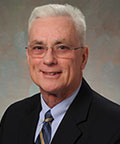March 13 was a sad day for the Management Department and the College of Business. On this day we lost one of our faculty members, Dr. Stephen Hallam, to a battle with cancer. He was diagnosed with cancer in 2014, and since then dealt with one of the trickiest curve balls of life with utmost grace and patience. His courage and willpower was an inspiration to many. He often used humor to describe his experience as a cancer patient. “Doctors ask me, so are you a smoker?” He would chuckle and continue with his story, “I reply; No, doctor, I have never smoked. But now that I have lung cancer, I am thinking of taking up smoking.” His humor in these difficult times was a reflection of his positive personality and unshakable optimism. He described himself as a lucky patient because of a breakthrough in his treatment that had bought him a couple of extra years of life. That he chose to focus on the silver lining, and not on the cloud, was a testimony to his psychological strength. He was a textbook example of positive emotion regulation and a walking-talking model of effective coping strategies. He celebrated what he had, ignored what he did not, shunned negativity and exuberated positivity. Never in the last three years of his life had anyone found him complaining about his ordeal, expressing self-pity, or making excuses about his professional duties. He continued to embrace his role as a professor whose job was to illuminate his students and be of service to his colleagues and the University.
Toward the end of his journey, even when it became clear to him that he had lost his battle to cancer, he remained a person of grace and dignity. He remained firm in his determination to teach and serve as long as he could. He did not opt out of life, he did not walk away from his mission as a scholar, and he did not quit caring about his students. On our department retreat this February it was the last time we all had the chance to see him as a group. Despite his failing health he came to our all-day retreat and enthusiastically participated in the proceedings. Many of us noticed an obvious decline in his physical health. As his colleagues, we deeply cared about him and knew that the inevitable is near. Although not intended so, our retreat turned out to be the only group farewell we could offer him, without any exchanges of goodbyes and thank yous.
“I'm not sure I really thanked him enough for his willingness to share from his life to help others” said Dr. McHenry. Dr. Hallam did not broadcast his valuable contributions to others. Dr. Osyk mentioned that he was one of the most consistent contributor to the Management Faculty Scholarship over the last ten years and took personal interest in the success of the scholarship program. Many of his colleagues vouch for his dedication to his students. Professor Schulte recollects that Dr. Hallam was always thinking about ways to benefit his students, whether it was by designing online courses to provide flexibility to his students, by authoring a lower cost Management textbook, or by dedicating royalties from his book to the Management Faculty Scholarship. Professor Chalfant echoes similar sentiments by describing Dr. Hallam as a selfless supporter of his students and fellow faculty members.
His generosity of spirit, compassion, and kindness are the most commonly noticed qualities about him. He was a person of integrity and optimism. He advised junior faculty to focus on the positives of one’s job and celebrate success. He cautioned us against being too critical in one’s work as it opens doors for cynicism. Dr. Dey remembers him as a sincere colleague and a helpful guide, who expressed immense confidence in the abilities of junior faculty.
Dr. Hallam believed in building bridges, accentuating the positives and reconciling differences. Dr. Osyk recalls that when Dr. Hallam returned to teaching after a number of years in administration he continued to provide his administrative advice in areas where he had expertise. She considers Dr. Hallam an excellent colleague, who was always willing to help others and take on service activities. He treated everyone with respect and generosity, be it his colleagues, staff members, or students. Ms. Simone reflects on her last six years as an administrative assistant with the Management department and states that Dr. Hallam became a very good friend who shared with her stories of his beloved family, bicycling adventures, and childhood stories. At department events he would take time to talk to our spouses and other family members, and identify common interests with them so as to make them feel welcome. Dr. Mukherjee describes him as a gentleman, who was never without a bright welcoming smile, and who inspired him with his inner strength during his battle with cancer.
Dr. Ash remembers him most for his humor, his willingness to share from his knowledge and experience, and his eternal optimism. These same attributes were also what made him such a fabulous teacher. Dr. Ash said “students send me unsolicited letters every year, telling what a great teacher Dr. Hallam was. The students have described how influential Dr. Hallam was for them. Some students, which are currently in management positions have stated that Dr. Hallam’s lessons from class one day were applied to a leadership situation the very next day. He had such impact on so many people.”
His loss will remain with us forever. To acknowledge his services to the University, the department of Management has decided to rename the Management Faculty Scholarship as the “Dr. Stephen F. Hallam Memorial Scholarship.”
Dr. Hallam, we did not get the chance to bid you a deserving farewell, but we will remember you as a great scholar, an amazing colleague and a great professor.
(Contributed by Dr. Maria Hamdani)

Dr. Stephen F. Hallam
